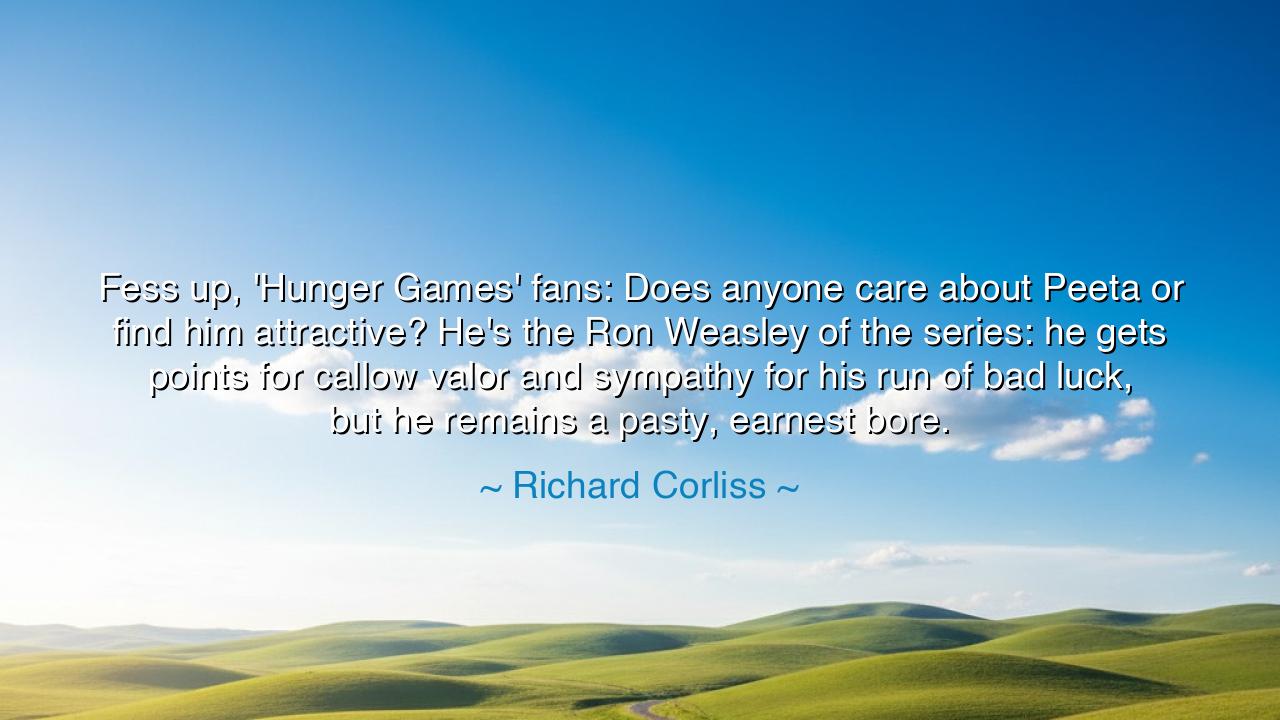
Fess up, 'Hunger Games' fans: Does anyone care about Peeta or
Fess up, 'Hunger Games' fans: Does anyone care about Peeta or find him attractive? He's the Ron Weasley of the series: he gets points for callow valor and sympathy for his run of bad luck, but he remains a pasty, earnest bore.






Hear, O lovers of story and seekers of meaning, the sharp words of Richard Corliss, critic and commentator on the art of narrative: “Fess up, Hunger Games fans: Does anyone care about Peeta or find him attractive? He’s the Ron Weasley of the series: he gets points for callow valor and sympathy for his run of bad luck, but he remains a pasty, earnest bore.” Though wrapped in wit, his words strike at a deeper truth: that not every hero of a tale shines with brilliance, and yet their presence is essential, for even those dismissed as “bores” embody virtues the world often forgets.
For Corliss speaks here not to destroy, but to provoke reflection. In the fierce contest of The Hunger Games, Katniss blazes with courage, Gale with fire and defiance. Against them stands Peeta, whose weapons are not rage or strength, but quiet loyalty, persistence, and sacrifice. To some, this seems pale beside the grandeur of others. Yet Corliss’ critique itself reveals the bias of the age: we often honor only the dazzling, forgetting the humble. The pasty, the unlucky, the overlooked—these, too, are threads in the tapestry of a great tale.
History offers many mirrors of this truth. Recall Ron Weasley, mentioned by Corliss himself, ever overshadowed by Harry’s heroism and Hermione’s brilliance. Yet it was Ron’s steadfast heart, his humor, and his willingness to stand beside his friends through despair, that gave the trio its strength. Or consider Patroclus in the Iliad, not the blazing Achilles, but the companion whose loyalty brought him to die in borrowed armor. Though overshadowed, his sacrifice stirred Achilles himself to greatness. Such characters may appear “earnest bores,” yet without them, the heroes of fire would stand hollow and alone.
Corliss’ observation that sympathy clings to Peeta because of his “run of bad luck” also strikes deep. The ancients knew well that fate weaves suffering into the lives of men, and that the nobility of a soul is not always in triumph but in endurance. Job in the scriptures was not praised for conquest but for patience amidst ruin. So too Peeta, whose suffering is constant, whose victories are few, yet whose will to remain true endures. To dismiss him is easy; to see his quiet heroism requires wisdom.
The deeper meaning of Corliss’ words is this: the measure of a character is not only in grandeur but in contrast, in what they reveal about others. Peeta, in his earnestness, reflects Katniss’s fire, softening her harshness and anchoring her in humanity. He is foil, balance, and mirror. Without him, her greatness might have hardened into cruelty. Thus, even the “boring” are vital, for they remind us that strength is not always noise; sometimes it is the whisper of loyalty that steadies the storm.
The lesson, O listener, is clear: do not despise the humble, the quiet, the overlooked. In life, as in story, not all are destined to dazzle, but all can endure with dignity. The world may laugh at the “earnest bore,” yet often it is these very souls who hold the fabric of families, friendships, and nations together. The fiery few may change the course of history, but it is the steadfast many who ensure that history endures.
Therefore, let Corliss’ provocation remind us to look deeper. When you encounter the Peetas of your life—those who seem overshadowed, awkward, or unlucky—do not dismiss them. Honor them for their perseverance, for their unwavering presence, for their courage in quiet forms. For in their loyalty lies a strength as necessary as the boldness of heroes, and in their endurance lies a lesson the world must never forget: true valor is not always brilliant, but it is always steadfast.
Thus the teaching endures: though critics may scoff and audiences may forget, the “earnest bore” may yet hold the truest heart. Cherish such figures, in stories and in life, for they are the unsung guardians of humanity’s flame.






AAdministratorAdministrator
Welcome, honored guests. Please leave a comment, we will respond soon